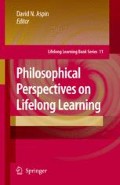Life-long learning is an eminently sensible idea. Given that learning is inherently human, and that we never really stop learning, how can anyone object to the attempts to organize such learning in a coherent manner? Yet, important though the idea of life-long learning is, it can be interpreted in a number of different ways. It is possible, for example, to distinguish between a humanistic, social democratic and an individualistic, neo-liberal self-capitalizing constructions of lifelong learning. In this paper, I want to show how, in recent years, it is the latter construction that has been vigorously promoted by such international organizations as the OECD, the World Bank, APEC and UNESCO, and has become hegemonic. I will do this by analyzing a number of recent reports on life-long learning, which highlight the need for national education systems to develop mobile, flexible and life-long learners and workers who have cosmopolitan sensibilities and who are able to deal effectively with cultural diversity, endemic change and innovation. In this way, I will argue that the idea of life-long learning is linked to a particular neo-liberal conception of the requirements of the global economy, which is characterized as informational, knowledge-based, post-industrial and service-orientated. Such an economy demands not only the development of ‘post-Fordist’ regimes of labour management but also systems of education, which produce new kind of workers who are motivated by concerns of industrial productivity and self-capitalization, and who are able to adapt to constant change, driven mostly by new technologies. I will argue that this conception of work and learning is based on a set of ideological assumptions not only about the nature of economic activity and social change but ultimately about citizenship itself –about what it means to learn, work and live in human communities.
Access this chapter
Tax calculation will be finalised at checkout
Purchases are for personal use only
Preview
Unable to display preview. Download preview PDF.
Author information
Authors and Affiliations
Editor information
Editors and Affiliations
Rights and permissions
Copyright information
© 2007 Springer
About this chapter
Cite this chapter
Rizvi, F. (2007). Lifelong Learning: Beyond Neo-Liberal Imaginary. In: Aspin, D.N. (eds) Philosophical Perspectives on Lifelong Learning. Lifelong Learning Book Series, vol 11. Springer, Dordrecht. https://doi.org/10.1007/978-1-4020-6193-6_7
Download citation
DOI: https://doi.org/10.1007/978-1-4020-6193-6_7
Publisher Name: Springer, Dordrecht
Print ISBN: 978-1-4020-6192-9
Online ISBN: 978-1-4020-6193-6
eBook Packages: Humanities, Social Sciences and LawEducation (R0)

